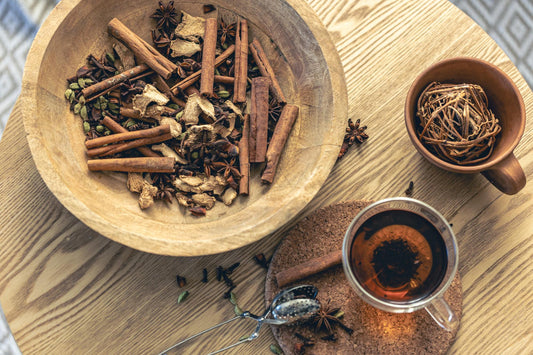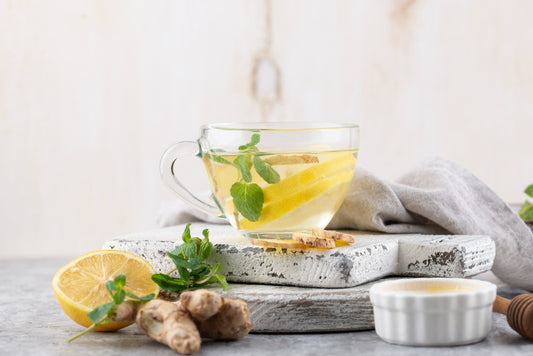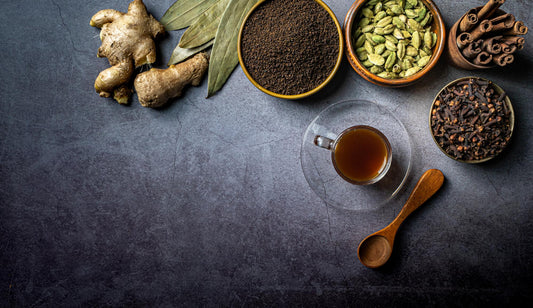Kashmiri Khawa Tea
Kashmiri Khawa Tea, one of the most beloved Green Tea blends has always been on the spotlight for its full-bodied, subtle spicy flavour, aromatic, captivating profile and potential health benefits.
However, a new topic that has been surfacing in the internet by tea lovers and DIY enthusiasts ‘How to make Kashmiri Khawa Tea at Home? Although it is not ‘rocket science’ to prepare this blend, the ingredients play a vital role on how the final product will turn out to be.
Remember, Khawa tea is renowned for its distinctive flavour profile, achieved through a carefully curated blend of ingredients.
So, let’s dive into preparing your own Kashmiri Chai Tea.
Ingredients Used in Khawa Tea
The primary components include:
Green Tea Leaves: The base of Khawa tea is typically green tea, which contributes a light and refreshing taste. The choice of green tea imparts health benefits, including antioxidants and a lower caffeine content compared to black tea.
Cinnamon: Cinnamon is used mainly as an aromatic condiment and flavouring additive while adding health benefits such as decrease blood pressure and healthy blood sugar regulation.
Clove: An aromatic spice that adds a subtly sweet flavor and lends plenty of warmth to the infusion. Additionally, it is good for your liver, stomach, and bone.
Cardamom: To add a distinctive flavor that complements both sweet and savory profile of Kashmiri Khawa Tea. The fragrance and a slightly sweet flavour are distinctly recognised in every sip. It treats nausea, stress, and anxiety.
Nutmeg: It has a distinctive pungent fragrance with nutty, earthy and a warm slightly sweet taste, but not sugary. When consumed in moderate quantity, it helps purify and cleanse the body.
Black Pepper: To add a sharp, penetrating aroma and a characteristic woody, piney flavor to the tea. The health benefits include better digestion, healthy hair, skin, etc.
Ginger: Ginger adds a spicy flavour, an invigorating aroma while producing a warming and subtle fiery taste to the tea. Some of the benefits of Ginger include treating sore throat, muscular aches, pains, vomiting, constipation, etc.
Almond: It adds subtle sweet and creamy texture to the infusion. The nutty flavour profile is distinct in the tea. Almond is good for your heart, cholesterol, blood sugar, etc.
Liquorice: It lends its distinct, intense, and polarizing flavour to the tea. While the flavour is predominantly inclined towards the sweeter side, a subtle tobacco flavour may be experienced. Key benefits include ulcer prevention, better digestion, prevention of cough and cold, etc.
Rose Petal: Rose petal adds a fainter version of its scent. A mild, sweet taste spreads across infusion while soothing pesky stomach troubles and promoting hydration, etc.
Saffron: The key ingredient that symbolises Kashmiri Kahwa Tea has a subtle earthy-sweet flavor profile with a tinge of bitterness on the tongue that gives way to delicate floral and honey notes. Saffron improves your mood, relieves stress, and promotes weight loss.
Pink Salt (Optional): Depending on the recipe, Khawa tea may incorporate a special ingredient that gives it a unique pink hue. Pink salt, indigenous to the Himalayan region, is often used for this purpose, contributing not only colour but also a subtle salty undertone.

Traditional Preparation Methods
The preparation of Khawa tea involves a meticulous process that has been passed down through generations. While variations exist, the traditional method typically includes the following steps:
Boiling Water: Water is brought to a boil in a pot or kettle, and green tea leaves are added. The tea leaves are allowed to steep, releasing their flavours into the water.
Spice Infusion: Aromatic spices, such as cardamom, cinnamon, cloves, etc. are added to the boiling water. This step infuses the tea with the rich, fragrant notes of the spices.
Milk Addition: Once the spices have imparted their essence, milk is added to the brewing mixture. The milk contributes a creamy texture and complements the spices, creating a harmonious blend.
Special Ingredient and Sweetening: Depending on the recipe, the special ingredient (e.g., pink salt) is added at this stage, giving the tea its unique colour. Sweeteners, if desired, are also incorporated to achieve the desired level of sweetness.
Straining and Serving: After simmering for a sufficient time, the Khawa tea is strained to remove tea leaves and spices. The resulting brew is then served in cups, ready to be enjoyed either on its own or accompanied by traditional Kashmiri snacks.
The traditional preparation methods of Khawa tea not only contribute to its distinctive taste but also play a role in preserving the cultural heritage associated with this beloved beverage.

Tips for Brewing the Perfect Cup
Quality Ingredients: Use high-quality green tea leaves and fresh spices for the best flavour. Fresh ingredients contribute to a more aromatic and flavorful brew.
Water Temperature: Be mindful of the temperature of the water. Steeping green tea at too high a temperature can result in bitterness. Aim for water just below the boiling point.
Brewing Time: Adjust the steeping time based on personal preferences. Longer steeping times intensify the flavors, but be cautious not to over-brew and make the tea bitter.
Experiment with the Milk Ratio: Customize the milk-to-tea ratio to achieve the desired creaminess. Some prefer a stronger tea flavour, while others enjoy a more milky consistency.
Creative Variations or Add-ins
- Essence: For a subtle and sweet twist, consider adding a drop of vanilla essence to the brewed tea.
- Herbal Infusions: Experiment with herbal infusions like mint or chamomile to create unique flavour profiles.
- Chai Masala Blend: Incorporate a pinch of chai masala for a spicier and more robust flavour.
Remember, making Khawa tea at home allows for creativity and personalization. Feel free to adjust the ingredients and proportions to suit your taste preferences and explore different variations to make each cup a unique and enjoyable experience.
Where to Find Quality Kashmiri Khawa Tea?
A. Specialty Tea Shops or Markets
Local Tea Retailers: Check with speciality tea shops in your local area or those with a focus on international or exotic teas. These establishments often carry a diverse selection of teas, including unique blends like Khawa tea.
Ethnic Grocery Stores: Explore ethnic or international grocery stores, particularly those catering to Indian or Kashmiri cuisine. These stores may carry packaged Khawa tea blends or the individual ingredients needed to make it at home.
Tea Festivals and Markets: Attend tea festivals or local markets that feature diverse tea offerings. These events provide an opportunity to discover and purchase Khawa tea directly from vendors who specialize in unique and traditional tea blends.
B. Online Sources for Purchasing Khawa Tea
Specialty Tea Websites: Explore online retailers that specialize in rare and exotic teas, such as ExoTeas. Many specialty tea websites source authentic blends from different regions, including Kashmir, allowing you to purchase Khawa tea blends or ingredients online.
E-commerce Platforms: Platforms like Amazon, Etsy, etc. often offer a variety of Khawa tea options. Read reviews and product descriptions to ensure the authenticity and quality of the product.
Precautions and Considerations
A. Caffeine Content
Awareness of Caffeine Levels: Khawa tea, like many traditional teas, contains caffeine, primarily from the green tea leaves. Individuals need to be aware of the caffeine content, especially if they are sensitive to caffeine or are trying to manage their overall caffeine intake.
Consideration for Sensitivity: People who are more sensitive to caffeine should be cautious and may want to choose low-caffeine or caffeine-free alternatives if they enjoy the flavours of Khawa tea but wish to minimize their caffeine intake.
Timing of consumption: Consuming Khawa tea in the evening may affect sleep for individuals sensitive to caffeine. It's advisable to enjoy Khawa tea earlier in the day or opt for a caffeine-free version in the evening.
B. Allergies or Sensitivities
Ingredient Awareness: Khawa tea contains various spices, including cardamom, cinnamon, and cloves. Individuals with known allergies or sensitivities to these spices should exercise caution and be aware of the specific ingredients used in the tea.
Customization for Allergies: When making Khawa tea at home or purchasing it, consider customizing the recipe or choosing pre-packaged blends that cater to specific allergies. Some variations may omit certain spices or include allergy-friendly alternatives.
Label Reading: When purchasing pre-packaged Khawa tea blends, carefully read the product labels for information on potential allergens. Manufacturers often provide detailed ingredient lists and allergen warnings to assist consumers.
C. Moderation in Consumption
Cultural Considerations: While Khawa tea may be a cultural staple in certain regions, it's essential to respect individual preferences and cultural practices. Some individuals may prefer to enjoy Khawa tea occasionally rather than as a daily beverage.
Balanced Diet: Khawa tea is a flavorful addition to a balanced diet, but it should not replace essential nutrients from other food sources. Encourage a diverse and well-rounded diet to ensure nutritional needs are met.
Consultation with Healthcare Professionals:
Individuals with existing health conditions, such as cardiovascular issues or pregnancy, should consult with healthcare professionals before making Khawa tea a regular part of their diet. Healthcare providers can provide personalized advice based on individual health circumstances.
Monitoring overall caffeine intake:
For those who consume other sources of caffeine, such as coffee or energy drinks, it's crucial to monitor their overall caffeine intake. Excessive caffeine consumption can lead to side effects like insomnia, nervousness, or an increased heart rate.
By being mindful of caffeine content, allergies, and overall consumption patterns, individuals can enjoy Khawa tea responsibly and incorporate it into a healthy and balanced lifestyle. As with any dietary choice, moderation and awareness of individual health considerations are key to a positive and enjoyable experience.
More on Kashmiri Khawa Tea
- Top 5 Health Benefits of Drinking Kashmiri Khawa Tea
- Kashmiri Kahwa Tea- The Origin and The Cultural Richness



